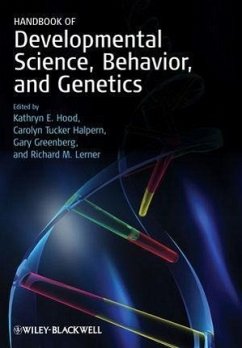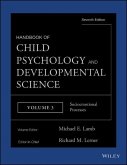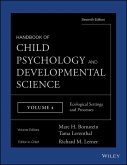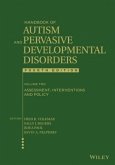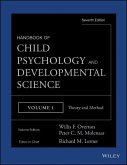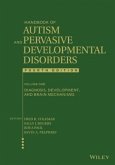Handbook of Developmental Science, Behavior, and Genetics
Herausgegeben von Hood, Kathryn E.; Halpern, Carolyn Tucker; Greenberg, Gary; Lerner, Richard M.
Handbook of Developmental Science, Behavior, and Genetics
Herausgegeben von Hood, Kathryn E.; Halpern, Carolyn Tucker; Greenberg, Gary; Lerner, Richard M.
- Gebundenes Buch
- Merkliste
- Auf die Merkliste
- Bewerten Bewerten
- Teilen
- Produkt teilen
- Produkterinnerung
- Produkterinnerung
The Handbook of Developmental Science, Behavior, and Genetics brings together the cutting-edge theory, research and methodology that contribute to our current scientific understanding of the role of genetics in the developmental system.
Commemorates the historically important contributions made by Gilbert Gottlieb in comparative psychology and developmental science Includes an international group of contributors who are among the most respected behavioral and biological scientists working today Examines the scientific basis for rejecting the reductionism and counterfactual approach to…mehr
Andere Kunden interessierten sich auch für
![Handbook of Child Psychology and Developmental Science, Set Handbook of Child Psychology and Developmental Science, Set]() Richard M. LernerHandbook of Child Psychology and Developmental Science, Set908,99 €
Richard M. LernerHandbook of Child Psychology and Developmental Science, Set908,99 €![Handbook of Child Psychology and Developmental Science, Cognitive Processes Handbook of Child Psychology and Developmental Science, Cognitive Processes]() Handbook of Child Psychology and Developmental Science, Cognitive Processes237,99 €
Handbook of Child Psychology and Developmental Science, Cognitive Processes237,99 €![Handbook of Child Psychology and Developmental Science, Socioemotional Processes Handbook of Child Psychology and Developmental Science, Socioemotional Processes]() Handbook of Child Psychology and Developmental Science, Socioemotional Processes237,99 €
Handbook of Child Psychology and Developmental Science, Socioemotional Processes237,99 €![Handbook of Child Psychology and Developmental Science, Ecological Settings and Processes Handbook of Child Psychology and Developmental Science, Ecological Settings and Processes]() Handbook of Child Psychology and Developmental Science, Ecological Settings and Processes237,99 €
Handbook of Child Psychology and Developmental Science, Ecological Settings and Processes237,99 €![Handbook of Autism and Pervasive Developmental Disorders, Volume 2 Handbook of Autism and Pervasive Developmental Disorders, Volume 2]() Fred R. VolkmarHandbook of Autism and Pervasive Developmental Disorders, Volume 2161,99 €
Fred R. VolkmarHandbook of Autism and Pervasive Developmental Disorders, Volume 2161,99 €![Handbook of Child Psychology and Developmental Science, Theory and Method Handbook of Child Psychology and Developmental Science, Theory and Method]() Handbook of Child Psychology and Developmental Science, Theory and Method237,99 €
Handbook of Child Psychology and Developmental Science, Theory and Method237,99 €![Handbook of Autism and Pervasive Developmental Disorders, Volume 1 Handbook of Autism and Pervasive Developmental Disorders, Volume 1]() Handbook of Autism and Pervasive Developmental Disorders, Volume 1165,99 €
Handbook of Autism and Pervasive Developmental Disorders, Volume 1165,99 €-
-
-
The Handbook of Developmental Science, Behavior, and Genetics brings together the cutting-edge theory, research and methodology that contribute to our current scientific understanding of the role of genetics in the developmental system.
Commemorates the historically important contributions made by Gilbert Gottlieb in comparative psychology and developmental science
Includes an international group of contributors who are among the most respected behavioral and biological scientists working today
Examines the scientific basis for rejecting the reductionism and counterfactual approach to understanding the links between genes, behavior, and development
Documents the current status of comparative psychology and developmental science and provides the foundation for future scientific progress in the field
Commemorates the historically important contributions made by Gilbert Gottlieb in comparative psychology and developmental science
Includes an international group of contributors who are among the most respected behavioral and biological scientists working today
Examines the scientific basis for rejecting the reductionism and counterfactual approach to understanding the links between genes, behavior, and development
Documents the current status of comparative psychology and developmental science and provides the foundation for future scientific progress in the field
Produktdetails
- Produktdetails
- Verlag: Wiley & Sons
- 1. Auflage
- Seitenzahl: 776
- Erscheinungstermin: 27. September 2010
- Englisch
- Abmessung: 249mm x 180mm x 48mm
- Gewicht: 666g
- ISBN-13: 9781405187824
- ISBN-10: 1405187824
- Artikelnr.: 29960089
- Herstellerkennzeichnung
- Libri GmbH
- Europaallee 1
- 36244 Bad Hersfeld
- gpsr@libri.de
- Verlag: Wiley & Sons
- 1. Auflage
- Seitenzahl: 776
- Erscheinungstermin: 27. September 2010
- Englisch
- Abmessung: 249mm x 180mm x 48mm
- Gewicht: 666g
- ISBN-13: 9781405187824
- ISBN-10: 1405187824
- Artikelnr.: 29960089
- Herstellerkennzeichnung
- Libri GmbH
- Europaallee 1
- 36244 Bad Hersfeld
- gpsr@libri.de
Kathryn E. Hood is an associate professor of human development at Pennsylvania State University. Her 30 years of active research includes the study of selective breeding in mice. She also analyzes interviews from children in the archival Carolina Longitudinal Study. Carolyn Tucker Halpern is an associate professor in the Department of Maternal and Child Health at the University of North Carolina at Chapel Hill. Her research focuses on biopsychosocial models of adolescent health and development, and the implications of adolescent experiences for young adult well-being. Gary Greenberg is Professor Emeritus of Psychology at Wichita State University and Adjunct Professor of Psychology at the University of Illinois - Chicago. He is a comparative psychologist, co-founder of the International Society for Comparative Psychology, and Historian/Archivist of APA's Division (6) of Behavioral Neuroscience and Comparative Psychology. Richard M. Lerner is the Bergstrom Chair in Applied Developmental Science within the Eliot-Pearson Department of Child Development and the Director of the Institute for Applied Youth Development, at Tufts University. Lerner is known for his theory of relations between life-span human development and social change, and for his research about the relations between adolescents and their peers, families, schools, and communities.
FOREWORD.
Gilbert Gottlieb and the Developmental Point of View (Evelyn Fox Keller,
Massachusetts Institute of Technology).
I. INTRODUCTION.
1. Developmental Systems, Nature-Nurture, and the Role of Genes in Behavior
and Development: On the Legacy of Gilbert Gottlieb (Kathryn E. Hood, The
Pennsylvania State University, Carolyn Tucker Halpern, University of North
Carolina at Chapel Hill, Gary Greenberg, Wichita State University, Richard
M. Lerner, Tufts University).
2. Normally Occurring Environmental and Behavioral Influences on Gene
Activity: From Central Dogma to Probabilistic Epigenesis (Gilbert Gottlieb
).
II. THEORETICAL FOUNDATIONS FOR THE DEVELOPMENTAL STUDY OF BEHAVIOR AND
GENETICS.
3. Historical and Philosophical Perspectives on Behavioral Genetics and
Developmental Science (James Tabery, University of Utah, Paul E. Griffiths,
University of Sydney).
4. Development and Evolution Revisited (Mae Wan Ho, Institute of Science in
Society).
5. Probabilistic Epigenesis and Modern Behavioral and Neural Genetics (
Douglas Wahlsten, University of North Carolina at Greensboro).
6. The Roles of Environment, Experience, and Learning in Behavioral
Development (George F. Michel, University of North Carolina at Greensboro
).
7. Contemporary Ideas in Physics and Biology in Gottlieb's Psychology (Ty
Partridge, Wayne State University, Gary Greenberg, Wichita State University
).
III. EMPIRICAL STUDIES OF BEHAVIORAL DEVELOPMENT AND GENETICS.
8. Behavioral Development during the Mother-Young Interaction in Placental
Mammals: The Development of Behavior in the Relationship with the Mother (
Jay S. Rosenblatt, Institute of Animal Behavior, Rutgers).
9. Amniotic Fluid as an Extended Milieu Interieur (Scott R. Robinson,
University of Iowa, Valerie Méndez-Gallardo, University of Iowa).
10. Developmental Effects of Selective Breeding for an Infant Trait (Susan
A. Brunelli, Columbia University Medical Center, Betty Zimmerberg, Williams
College, Myron A. Hofer, Columbia University Medical Center).
11. Emergence and Constraint in Novel Behavioral Adaptations (Kathryn E.
Hood, The Pennsylvania State University).
12. Nonhuman Primate Research Contributions to Understanding Genetic and
Environmental Influences on Phenotypic Outcomes across Development (
Allyson Bennett and Peter J. Pierre, Wake Forest University).
13. Interactive Contributions of Genes and Early Experience to Behavioural
Development: Sensitive Periods and Lateralized Brain and Behaviour (Lesley
J. Rogers, University of New England, Armidale).
14. Trans-Generational Epigenetic Inheritance (Lawrence V. Harper,
University of California, Davis).
15. The Significance of Non-Replication of Gene-Phenotype Associations (
Carolyn Tucker Halpern, University of North Carolina at Chapel Hill).
16. Canalization and Malleability Reconsidered: The Developmental Basis of
Phenotypic Stability and Variability (Robert Lickliter and Christopher
Harshaw, Florida International University).
IV. APPLICATIONS TO DEVELOPMENT.
17. Gene-Parenting Interplay in the Development of Infant Emotionality (
Cathi B. Propper, The University of North Carolina at Chapel Hill, Ginger
A. Moore, The Pennsylvania State University, W. Roger Mills-Koonce, The
University of North Carolina at Chapel Hill).
18. Genetic Research in Psychiatry and Psychology: A Critical Overview (
Jay Joseph, Licensed Psychologist).
19. On the Limits of Standard Quantitative Genetic Modeling of
Inter-Individual Variation: Extensions, Ergodic Conditions and a New
Genetic Factor Model of Intra-Individual Variation (Peter C. M. Molenaar,
The Pennsylvania State University).
20. Songs My Mother Taught Me: Gene-Environment Interactions, Brain
Development and the Auditory System: Thoughts on Non-Kin Rejection, Part II
(Elaine L. Bearer, University of New Mexico).
21. Applications of Developmental Systems Theory to Benefit Human
Development: On the Contributions of Gilbert Gottlieb to Individuals,
Families, and Communities (Richard M. Lerner, Michelle J. Boyd, Megan K.
Kiely, Christopher M. Napolitano, and Kristina L. Schmid, Tufts University
).
Name Index.
Subject Index.
Gilbert Gottlieb and the Developmental Point of View (Evelyn Fox Keller,
Massachusetts Institute of Technology).
I. INTRODUCTION.
1. Developmental Systems, Nature-Nurture, and the Role of Genes in Behavior
and Development: On the Legacy of Gilbert Gottlieb (Kathryn E. Hood, The
Pennsylvania State University, Carolyn Tucker Halpern, University of North
Carolina at Chapel Hill, Gary Greenberg, Wichita State University, Richard
M. Lerner, Tufts University).
2. Normally Occurring Environmental and Behavioral Influences on Gene
Activity: From Central Dogma to Probabilistic Epigenesis (Gilbert Gottlieb
).
II. THEORETICAL FOUNDATIONS FOR THE DEVELOPMENTAL STUDY OF BEHAVIOR AND
GENETICS.
3. Historical and Philosophical Perspectives on Behavioral Genetics and
Developmental Science (James Tabery, University of Utah, Paul E. Griffiths,
University of Sydney).
4. Development and Evolution Revisited (Mae Wan Ho, Institute of Science in
Society).
5. Probabilistic Epigenesis and Modern Behavioral and Neural Genetics (
Douglas Wahlsten, University of North Carolina at Greensboro).
6. The Roles of Environment, Experience, and Learning in Behavioral
Development (George F. Michel, University of North Carolina at Greensboro
).
7. Contemporary Ideas in Physics and Biology in Gottlieb's Psychology (Ty
Partridge, Wayne State University, Gary Greenberg, Wichita State University
).
III. EMPIRICAL STUDIES OF BEHAVIORAL DEVELOPMENT AND GENETICS.
8. Behavioral Development during the Mother-Young Interaction in Placental
Mammals: The Development of Behavior in the Relationship with the Mother (
Jay S. Rosenblatt, Institute of Animal Behavior, Rutgers).
9. Amniotic Fluid as an Extended Milieu Interieur (Scott R. Robinson,
University of Iowa, Valerie Méndez-Gallardo, University of Iowa).
10. Developmental Effects of Selective Breeding for an Infant Trait (Susan
A. Brunelli, Columbia University Medical Center, Betty Zimmerberg, Williams
College, Myron A. Hofer, Columbia University Medical Center).
11. Emergence and Constraint in Novel Behavioral Adaptations (Kathryn E.
Hood, The Pennsylvania State University).
12. Nonhuman Primate Research Contributions to Understanding Genetic and
Environmental Influences on Phenotypic Outcomes across Development (
Allyson Bennett and Peter J. Pierre, Wake Forest University).
13. Interactive Contributions of Genes and Early Experience to Behavioural
Development: Sensitive Periods and Lateralized Brain and Behaviour (Lesley
J. Rogers, University of New England, Armidale).
14. Trans-Generational Epigenetic Inheritance (Lawrence V. Harper,
University of California, Davis).
15. The Significance of Non-Replication of Gene-Phenotype Associations (
Carolyn Tucker Halpern, University of North Carolina at Chapel Hill).
16. Canalization and Malleability Reconsidered: The Developmental Basis of
Phenotypic Stability and Variability (Robert Lickliter and Christopher
Harshaw, Florida International University).
IV. APPLICATIONS TO DEVELOPMENT.
17. Gene-Parenting Interplay in the Development of Infant Emotionality (
Cathi B. Propper, The University of North Carolina at Chapel Hill, Ginger
A. Moore, The Pennsylvania State University, W. Roger Mills-Koonce, The
University of North Carolina at Chapel Hill).
18. Genetic Research in Psychiatry and Psychology: A Critical Overview (
Jay Joseph, Licensed Psychologist).
19. On the Limits of Standard Quantitative Genetic Modeling of
Inter-Individual Variation: Extensions, Ergodic Conditions and a New
Genetic Factor Model of Intra-Individual Variation (Peter C. M. Molenaar,
The Pennsylvania State University).
20. Songs My Mother Taught Me: Gene-Environment Interactions, Brain
Development and the Auditory System: Thoughts on Non-Kin Rejection, Part II
(Elaine L. Bearer, University of New Mexico).
21. Applications of Developmental Systems Theory to Benefit Human
Development: On the Contributions of Gilbert Gottlieb to Individuals,
Families, and Communities (Richard M. Lerner, Michelle J. Boyd, Megan K.
Kiely, Christopher M. Napolitano, and Kristina L. Schmid, Tufts University
).
Name Index.
Subject Index.
FOREWORD.
Gilbert Gottlieb and the Developmental Point of View (Evelyn Fox Keller,
Massachusetts Institute of Technology).
I. INTRODUCTION.
1. Developmental Systems, Nature-Nurture, and the Role of Genes in Behavior
and Development: On the Legacy of Gilbert Gottlieb (Kathryn E. Hood, The
Pennsylvania State University, Carolyn Tucker Halpern, University of North
Carolina at Chapel Hill, Gary Greenberg, Wichita State University, Richard
M. Lerner, Tufts University).
2. Normally Occurring Environmental and Behavioral Influences on Gene
Activity: From Central Dogma to Probabilistic Epigenesis (Gilbert Gottlieb
).
II. THEORETICAL FOUNDATIONS FOR THE DEVELOPMENTAL STUDY OF BEHAVIOR AND
GENETICS.
3. Historical and Philosophical Perspectives on Behavioral Genetics and
Developmental Science (James Tabery, University of Utah, Paul E. Griffiths,
University of Sydney).
4. Development and Evolution Revisited (Mae Wan Ho, Institute of Science in
Society).
5. Probabilistic Epigenesis and Modern Behavioral and Neural Genetics (
Douglas Wahlsten, University of North Carolina at Greensboro).
6. The Roles of Environment, Experience, and Learning in Behavioral
Development (George F. Michel, University of North Carolina at Greensboro
).
7. Contemporary Ideas in Physics and Biology in Gottlieb's Psychology (Ty
Partridge, Wayne State University, Gary Greenberg, Wichita State University
).
III. EMPIRICAL STUDIES OF BEHAVIORAL DEVELOPMENT AND GENETICS.
8. Behavioral Development during the Mother-Young Interaction in Placental
Mammals: The Development of Behavior in the Relationship with the Mother (
Jay S. Rosenblatt, Institute of Animal Behavior, Rutgers).
9. Amniotic Fluid as an Extended Milieu Interieur (Scott R. Robinson,
University of Iowa, Valerie Méndez-Gallardo, University of Iowa).
10. Developmental Effects of Selective Breeding for an Infant Trait (Susan
A. Brunelli, Columbia University Medical Center, Betty Zimmerberg, Williams
College, Myron A. Hofer, Columbia University Medical Center).
11. Emergence and Constraint in Novel Behavioral Adaptations (Kathryn E.
Hood, The Pennsylvania State University).
12. Nonhuman Primate Research Contributions to Understanding Genetic and
Environmental Influences on Phenotypic Outcomes across Development (
Allyson Bennett and Peter J. Pierre, Wake Forest University).
13. Interactive Contributions of Genes and Early Experience to Behavioural
Development: Sensitive Periods and Lateralized Brain and Behaviour (Lesley
J. Rogers, University of New England, Armidale).
14. Trans-Generational Epigenetic Inheritance (Lawrence V. Harper,
University of California, Davis).
15. The Significance of Non-Replication of Gene-Phenotype Associations (
Carolyn Tucker Halpern, University of North Carolina at Chapel Hill).
16. Canalization and Malleability Reconsidered: The Developmental Basis of
Phenotypic Stability and Variability (Robert Lickliter and Christopher
Harshaw, Florida International University).
IV. APPLICATIONS TO DEVELOPMENT.
17. Gene-Parenting Interplay in the Development of Infant Emotionality (
Cathi B. Propper, The University of North Carolina at Chapel Hill, Ginger
A. Moore, The Pennsylvania State University, W. Roger Mills-Koonce, The
University of North Carolina at Chapel Hill).
18. Genetic Research in Psychiatry and Psychology: A Critical Overview (
Jay Joseph, Licensed Psychologist).
19. On the Limits of Standard Quantitative Genetic Modeling of
Inter-Individual Variation: Extensions, Ergodic Conditions and a New
Genetic Factor Model of Intra-Individual Variation (Peter C. M. Molenaar,
The Pennsylvania State University).
20. Songs My Mother Taught Me: Gene-Environment Interactions, Brain
Development and the Auditory System: Thoughts on Non-Kin Rejection, Part II
(Elaine L. Bearer, University of New Mexico).
21. Applications of Developmental Systems Theory to Benefit Human
Development: On the Contributions of Gilbert Gottlieb to Individuals,
Families, and Communities (Richard M. Lerner, Michelle J. Boyd, Megan K.
Kiely, Christopher M. Napolitano, and Kristina L. Schmid, Tufts University
).
Name Index.
Subject Index.
Gilbert Gottlieb and the Developmental Point of View (Evelyn Fox Keller,
Massachusetts Institute of Technology).
I. INTRODUCTION.
1. Developmental Systems, Nature-Nurture, and the Role of Genes in Behavior
and Development: On the Legacy of Gilbert Gottlieb (Kathryn E. Hood, The
Pennsylvania State University, Carolyn Tucker Halpern, University of North
Carolina at Chapel Hill, Gary Greenberg, Wichita State University, Richard
M. Lerner, Tufts University).
2. Normally Occurring Environmental and Behavioral Influences on Gene
Activity: From Central Dogma to Probabilistic Epigenesis (Gilbert Gottlieb
).
II. THEORETICAL FOUNDATIONS FOR THE DEVELOPMENTAL STUDY OF BEHAVIOR AND
GENETICS.
3. Historical and Philosophical Perspectives on Behavioral Genetics and
Developmental Science (James Tabery, University of Utah, Paul E. Griffiths,
University of Sydney).
4. Development and Evolution Revisited (Mae Wan Ho, Institute of Science in
Society).
5. Probabilistic Epigenesis and Modern Behavioral and Neural Genetics (
Douglas Wahlsten, University of North Carolina at Greensboro).
6. The Roles of Environment, Experience, and Learning in Behavioral
Development (George F. Michel, University of North Carolina at Greensboro
).
7. Contemporary Ideas in Physics and Biology in Gottlieb's Psychology (Ty
Partridge, Wayne State University, Gary Greenberg, Wichita State University
).
III. EMPIRICAL STUDIES OF BEHAVIORAL DEVELOPMENT AND GENETICS.
8. Behavioral Development during the Mother-Young Interaction in Placental
Mammals: The Development of Behavior in the Relationship with the Mother (
Jay S. Rosenblatt, Institute of Animal Behavior, Rutgers).
9. Amniotic Fluid as an Extended Milieu Interieur (Scott R. Robinson,
University of Iowa, Valerie Méndez-Gallardo, University of Iowa).
10. Developmental Effects of Selective Breeding for an Infant Trait (Susan
A. Brunelli, Columbia University Medical Center, Betty Zimmerberg, Williams
College, Myron A. Hofer, Columbia University Medical Center).
11. Emergence and Constraint in Novel Behavioral Adaptations (Kathryn E.
Hood, The Pennsylvania State University).
12. Nonhuman Primate Research Contributions to Understanding Genetic and
Environmental Influences on Phenotypic Outcomes across Development (
Allyson Bennett and Peter J. Pierre, Wake Forest University).
13. Interactive Contributions of Genes and Early Experience to Behavioural
Development: Sensitive Periods and Lateralized Brain and Behaviour (Lesley
J. Rogers, University of New England, Armidale).
14. Trans-Generational Epigenetic Inheritance (Lawrence V. Harper,
University of California, Davis).
15. The Significance of Non-Replication of Gene-Phenotype Associations (
Carolyn Tucker Halpern, University of North Carolina at Chapel Hill).
16. Canalization and Malleability Reconsidered: The Developmental Basis of
Phenotypic Stability and Variability (Robert Lickliter and Christopher
Harshaw, Florida International University).
IV. APPLICATIONS TO DEVELOPMENT.
17. Gene-Parenting Interplay in the Development of Infant Emotionality (
Cathi B. Propper, The University of North Carolina at Chapel Hill, Ginger
A. Moore, The Pennsylvania State University, W. Roger Mills-Koonce, The
University of North Carolina at Chapel Hill).
18. Genetic Research in Psychiatry and Psychology: A Critical Overview (
Jay Joseph, Licensed Psychologist).
19. On the Limits of Standard Quantitative Genetic Modeling of
Inter-Individual Variation: Extensions, Ergodic Conditions and a New
Genetic Factor Model of Intra-Individual Variation (Peter C. M. Molenaar,
The Pennsylvania State University).
20. Songs My Mother Taught Me: Gene-Environment Interactions, Brain
Development and the Auditory System: Thoughts on Non-Kin Rejection, Part II
(Elaine L. Bearer, University of New Mexico).
21. Applications of Developmental Systems Theory to Benefit Human
Development: On the Contributions of Gilbert Gottlieb to Individuals,
Families, and Communities (Richard M. Lerner, Michelle J. Boyd, Megan K.
Kiely, Christopher M. Napolitano, and Kristina L. Schmid, Tufts University
).
Name Index.
Subject Index.

